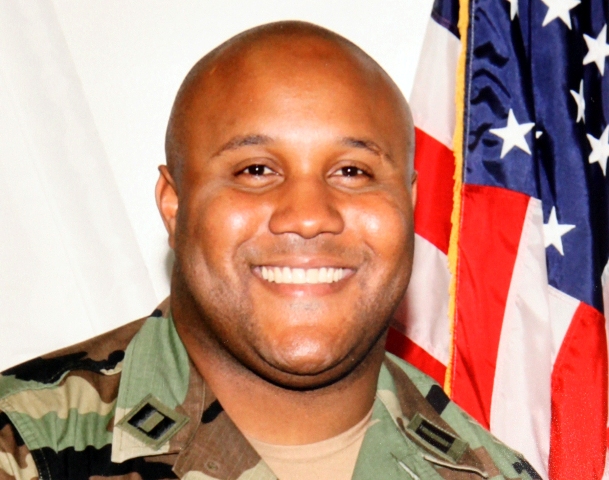
OUT OF SYNC–This undated photo shows Christopher Dorner, a former Los Angeles Police officer. Like the Unabomber and other mass killers, the 33-year-old former cop wrote a “manifesto.” (AP Photo/Los Angeles Police Department, File)
by A. Breed, Julie Watson and Tami Abdollah
Associated Press Writers
BIG BEAR LAKE, Calif. (AP) — As soon as he heard officers were chasing the suspected cop killer in a stolen truck, San Bernardino County Sheriff’s Deputy Roger Loftis was certain: His buddy Jeremiah MacKay would be there.
In 15 years with the department, “Jer” had earned about a dozen and a half awards for 10851s — the California penal code for grand theft auto. Once, while heading to a bar to celebrate another award, MacKay noticed there were no keys in the ignition of the car next to him at a traffic light, and he veered off.
He waltzed into the bar two hours later, a grin stretched across that fair, freckled face, a copy of an auto recovery record in his hand.
Last week, Loftis called his fishing, drinking and golfing buddy to see how he was doing. He knew the 35-year-old detective had been working around the clock, scouring the San Bernardino Mountains in the search for former Los Angeles Police Officer Christopher Dorner.
“If that guy’s still on this mountain,” MacKay told him, “I’m going to find him.”
When the announcer reported that two deputies had exchanged fire with the suspect, Loftis got a sick feeling in his stomach. The 54-year-old corrections officer sent his friend a text.
“I know you’re busy,” he typed. “But let me know you’re OK. ASAP.”
There was no answer.
About an hour later, a colleague called with the news: MacKay, husband and father of two, was dead. Soon, so would be his killer.
Like the Unabomber and other mass killers, the 33-year-old former cop wrote a “manifesto.” And, like so many others, Dorner’s perceptions of the world and its supposed injustices against him seem out of sync with reality.
Why now?
Was it the supposed institutional racism that cost him his LAPD badge? That was four years ago.
Was it, as he once suggested, residual trauma from his military service in the Middle East? Records show a relatively benign tour of duty, well outside the war zone.
One marriage fell apart; a second went no further than the license application. This, too, he seemed to blame on others — anyone but himself.
“I never had the opportunity to have a family of my own,” he wrote to his targets. “I’m terminating yours.”
Even his boasts of paramilitary prowess and promise to “bring unconventional and asymmetrical warfare” to southern California evaporated in a cavalcade of broken-down vehicles, failed hijackings and a botched hog-tying. His weeklong stint as America’s most wanted fugitive ended in a shootout with police, and then what officials said was a self-inflicted gunshot to the head.
